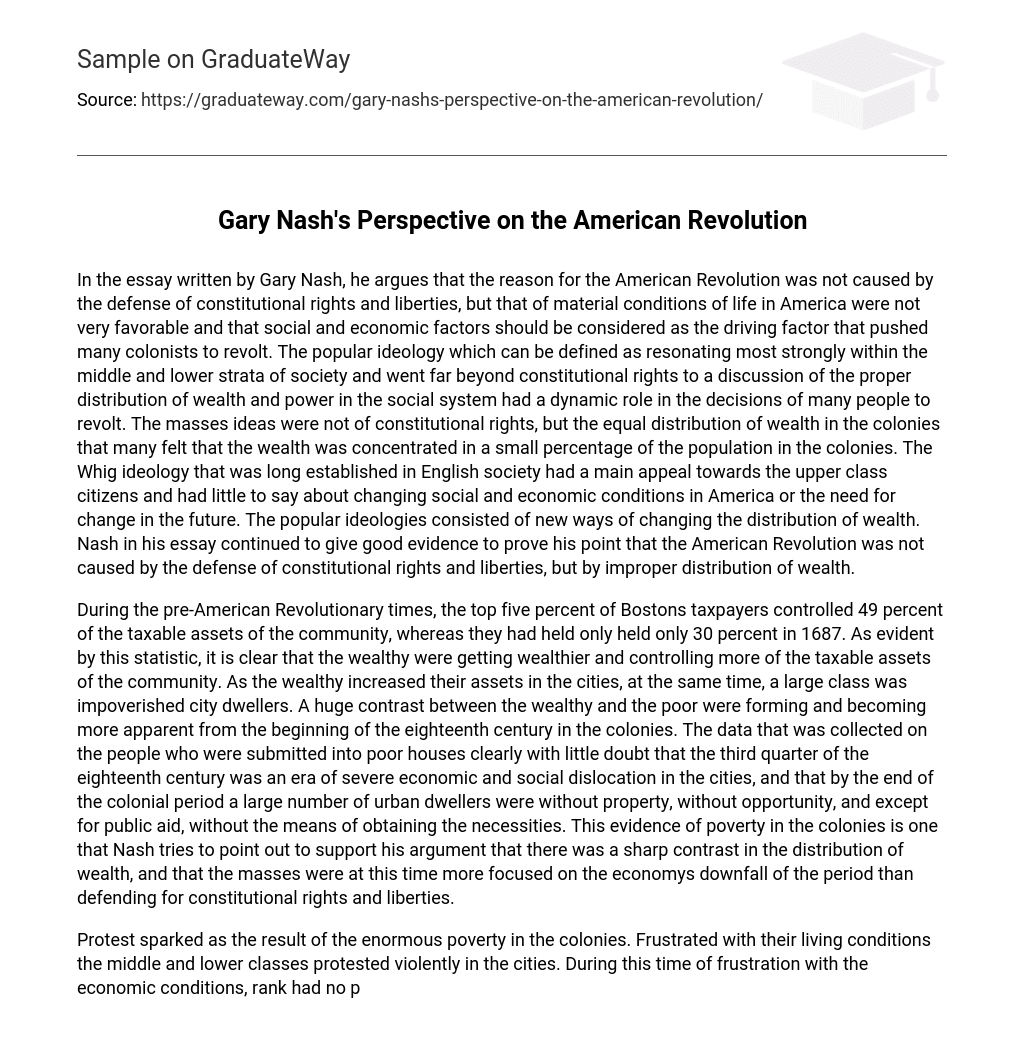Gary Nash argues that the American Revolution was not primarily motivated by a desire to protect constitutional rights and liberties. Instead, he suggests that it was the poor living conditions in America that drove many colonists to rebel. According to Nash, social and economic factors played a crucial role in their decision to revolt. This viewpoint resonated strongly with the middle and lower classes, going beyond concerns about constitutional rights and focusing on achieving a fair distribution of wealth and power within society. Many colonists believed that only a small portion of the population held most of the wealth, which fueled their desire for change.
In contrast, England’s prevailing Whig ideology appealed more to the upper class and did not address America’s need for social and economic reform. Nash provides evidence supporting his argument that it was not the defense of constitutional rights but rather an unequal distribution of wealth that propelled the American Revolution.
During the pre-American Revolutionary era in Boston, nearly half (49%) of the community’s taxable assets were controlled by the wealthiest 5% of taxpayers. This marked a significant increase from the observed 30% in 1687, indicating a growing concentration of wealth among the rich. Colonial cities experienced a stark contrast between affluent and impoverished individuals, with many city residents facing poverty. Records from poor houses clearly demonstrate widespread economic and social disruption during this time period. By the end of colonial times, a substantial number of urban dwellers had no property or opportunities and relied solely on public assistance for their basic needs. Nash uses this evidence to support his argument that there was an evident disparity in wealth distribution during this period. Furthermore, he argues that people were more concerned about their worsening economic conditions rather than defending their constitutional rights and freedoms.
There was a protest in the colonies due to the extreme poverty. The middle and lower classes, frustrated with their living conditions, violently protested in the cities. Even the lieutenant-governor of Massachusetts was shot during this time of economic frustration, showing that rank did not have privileges. The wealthy individuals were targeted with great force as discontented people who wanted a fair distribution of wealth destroyed many of their homes. The people of Boston were especially upset when the wealthy merchants rejected a land bank proposal that would have eased economic distress by issuing more paper money and perpetuating inflationist policies. The wealthy merchants opposed paper money because it only benefited the poor. The animosity between the wealthy and the poor continued to grow with the rise of religious fervor in the colonies. Preachers spread a message to the masses about establishing authority, urging city dwellers to participate in mass revivals that eliminated social distances between clergy and worshipers. These messages from preachers spread throughout the region, leading the masses to believe they had authority and envision a government based on the people’s power, free from the vast wealth disparities of the old world.People in the lower classes felt that they had a say in government policies, but the wealthy still had significant influence. The lower classes were resentful of the wealthy and criticized their unequal distribution of wealth. The economic constraints of the time were crucial, and people desperately needed a change in the social and economic structure. The defense of constitutional rights or liberties, as previously claimed by historians, was not apparent, as argued by Gary Nash in his essay. The lower classes, particularly, were preoccupied with their finances and protested against the wealthy colonists. They wanted to convey the message that they should have a voice in the economic circumstances and that reforms should be made to address the unequal distribution of wealth in the colonies.
Bibliography: Gary Nash essay





